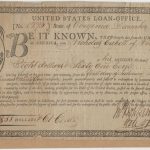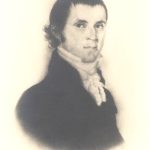Revolutionaries
Revolution: The Four Colonels

At least a half-dozen Cabell citizen-soldiers were present for the surrender of Lord Cornwallis at Yorktown, depicted above.
By their political and military service on behalf of the colonists in the American Revolution, the Cabell family earned a reputation for patriotism. Early on, the Cabells identified with the patriot cause. William Cabell, Sr. (1730-1798), for example, participated wholeheartedly in the non-importation movement of the early 1770s, designed to force Parliament to address colonial complaints by reducing transatlantic commerce. In 1771, he sent only enough tobacco to England to pay off his debts and acquire a few books, and later in that year he began to manufacture brandy, something which he had previously ordered from the old country.

After independence was won, the Cabell brothers would continue to support the American experiment. Above is a government bond purchased by Nicholas Cabell in December 1797.
Before the conflict began, three Cabell brothers, William, Sr., Joseph, and John were already serving their neighbors as elected representatives in Virginia’s assembly. Their younger brother, Nicholas, was only sixteen in 1776 and, understandably, did not join his brothers as a delegate in the General Assembly that year. He would be elected to that body for the first time in 1779, as a representative from Amherst County. From these positions of leadership, the Cabells were in an excellent position to help mobilize the Virginia upcountry for combat, a task which they performed commendably.
As the oldest brother, William held the most formal authority. Between May 1774 and July 1776, when the colonial assembly disbanded and Patrick Henry assumed the office of governor, a Committee of Safety held the executive power for Virginia. William not only chaired Amherst County’s own committee of safety, but also served as the only resident of Piedmont on the colony-wide committee. Joseph and John helped to raise troops, and Joseph switched from a civil to a military role in 1779, when he marched forth with some of the men whom he had recruited. John appears to have maintained only a civil role and frequently attended the Assembly as a representative from Buckingham.
The dashing young Nicholas (left) acted decisively that his brothers would not outstrip him in the hunt for patriotic glory. He left school at William and Mary and joined two of his nephews, Robert and John Horsley, in a company of “Minute Men” that began service in 1776. Nicholas gained a commission in the Virginia militia in June 1778 as Lt. Col. He later gained the rank of full colonel.
Nicholas, Joseph, at least two of William’s sons (Landon and William, Jr.), Joseph’s eldest son (Joseph, Jr.), and probably the Horsley brothers came together at Yorktown, in October or 1781. The presence of so many Cabells at the surrender of the main British army under Lord Cornwallis neatly epitomizes the depth of the family’s contributions to the Revolution.
Additional Source Consulted:
R. W. Cabell, The Cabells and the Decade of Decision: Williamsburg, 1771-1781 (1996)

